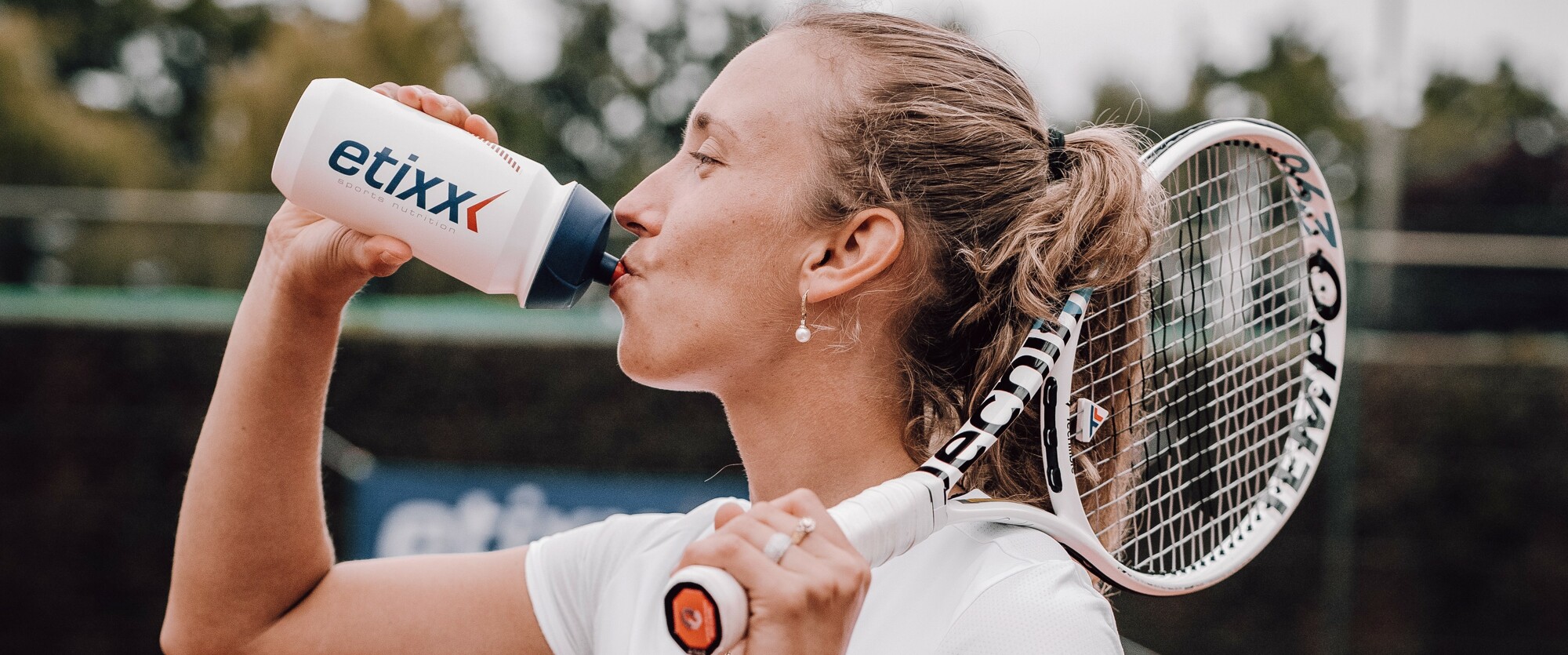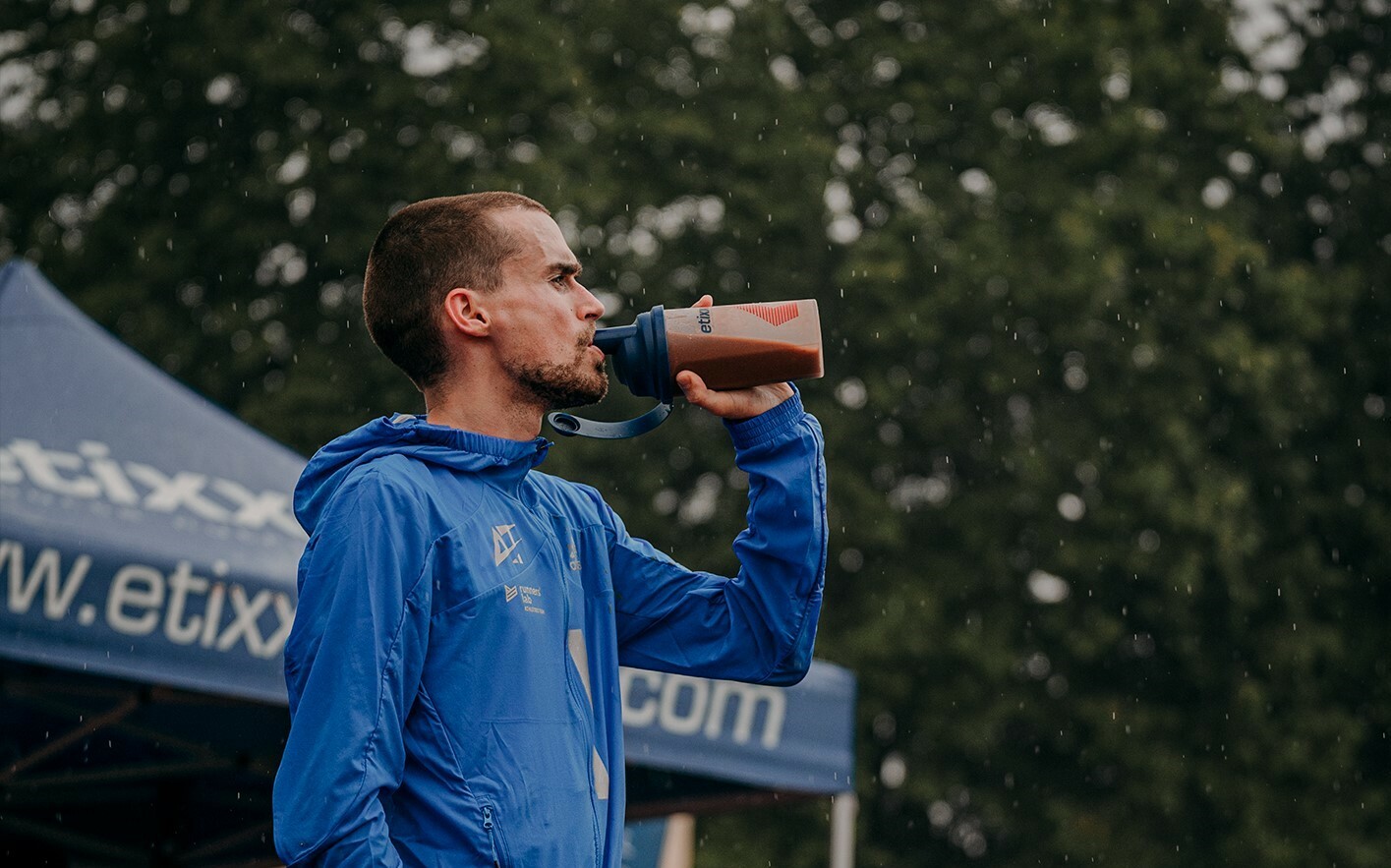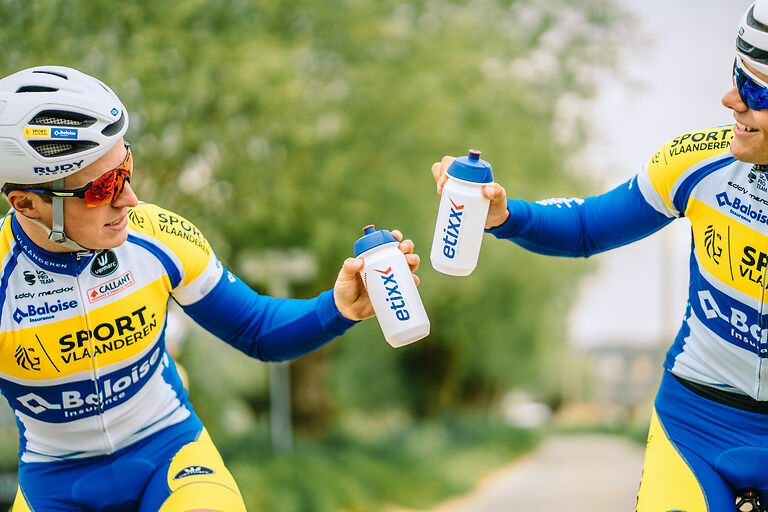Hydration while sporting: 5 tips
Tuesday 09 August 2022

Did you know : When you lose 2% of your body weight through sweat, there is already a 10-20% drop in your performance level. As soon as a slight form of dehydration occurs, in any sport, it becomes more difficult to continue with the same intensity. Therefore, it is very important to stay within the maximum of 2% body weight loss.
Obviously, fluid loss depends on weather conditions and the type of sport. A volleyball player playing a match in a hot gym and a runner completing interval training under the midday sun will lose more sweat than a swimmer. He or she will therefore need to pay more attention to hydration.
Sufficient hydration is also important in strength athletes. Research has shown that when a strength athlete gets dehydrated, he or she can lift lower weights. Those who want to make more gains during their strength training sessions will need to hydrate adequately.
So paying enough attention to drinking before, during and after exercise is the message. What, when and how much you drink is sometimes difficult to determine. In this blog, we reveal 5 ultimate tips to keep your fluid balance balanced during exercise.
TIP 1: Drink 500ml per hour in small sips. Ideally 125-250ml every 15 minutes
Exactly how much should you drink during exercise? Although this individually depends a lot on how much you sweat and on the weather conditions in which you exercise, you can generally count on a fluid loss of 500 - 800ml per hour. The lost fluid must therefore be reabsorbed.
It is not always easy to drink enough during exercise, especially if you are running or playing in a team with limited breaks. But if you pay enough attention to your fluid intake, it is certainly possible.
Basically, you start losing fluids from the very first minute. Therefore, don't wait until you start feeling thirsty to drink. Try to compensate for fluid loss by drinking a little at as many times as possible. Ideally, take 125-250ml through small sips every 15 minutes.
For efforts lasting less than one hour, the risk of dehydration is lower, implying that drinking in between becomes less important. Nevertheless, for such short efforts, you should make sure you start the activity before with sufficient fluids in your body.
TIP 2: Opt for isotonic sports drinks
For years, science has recommended drinking plain water while exercising. However, more recent studies have shown that in certain circumstances it may be better to drink something enriched with carbohydrates and minerals. The underlying reason is found in the 3 purposes that drinking can fulfil during exercise:
- It replenishes moisture lost through sweat
- It can supply carbohydrates so that the body's glycogen reserves (stored carbohydrates) are saved and blood sugar levels are maintained
- It can supply minerals (electrolytes), accelerating water absorption and maintaining blood volume.
An isotonic drink contains the necessary minerals in addition to carbohydrates (4-8g/100ml). That makes this the type of drink that fulfils the above goals. As the name suggests, an isotonic drink is also 100% isotonic. This means that the concentration of dissolved particles (carbohydrates and minerals) in these drinks is exactly the same as in our blood. An isotonic drink therefore ensures that both fluid, minerals, and carbohydrates are absorbed into our body efficiently and faster than e.g. water.
The mineral sodium also plays an important role in isotonic drinks. It stimulates the feeling of thirst and retains fluid in the body for longer. A good isotonic sports drink contains between 400-1100mg of sodium per litre of liquid.
Etixx Isotonic is therefore the most suitable drink for optimal hydration and providing energy. An additional advantage of the Etixx Isotonic is its neutral pH and choice of natural sweeteners, which reduces the risk of gastrointestinal problems. Etixx Isotonic is available in 4 flavours: forest fruit, watermelon, orange/mango and lemon.

TIP 3: Drink enough beforehand
Not only the fluid we take in during exercise has an effect on performance but also the amount of fluid we take in the days and hours before an exercise has an impact on performance levels.
It goes without saying that an athlete who arrives at the start sufficiently hydrated is less likely to experience a performance drop due to fluid loss. This makes prehydration an important part of the preparation for training/competition and one to which, as an athlete, it is best to devote sufficient attention.
The colour of urine is a good indicator. Is your urine colourless at the start of an effort? Then you are well hydrated! Dark urine, on the other hand, indicates a fluid imbalance.
Pay extra attention to prehydration if you know it will be hot or if you have a race where it is difficult to drink during exercise.
What can you drink? The first choice is water. Water is the main source of fluid in the days/hours before an effort. It is certainly also interesting to replenish the minerals you will lose during exercise beforehand by means of a salt tablet or ORS. Choose this if you know you will be exercising in the heat or if you are prone to sweat production. The Etixx Sport Hydro Tab is a salt tablet you can use to replenish in advance the 4 minerals you will lose through sweat (sodium, potassium, calcium and magnesium).
TIP 4: Do not drink drinks that are too cold or too hot. Ideal temperature: 10 - 15°C
Is it a good idea to put your drinks in the fridge beforehand so you have a water bottle of ice-cold sports drink for during the exertion? The answer is no. A drink that is too cold (<10°C) is absorbed more slowly and can cause problems in the stomach. Ice-cold drinks will slow absorption and digestion and cause the bloodways to constrict. You may miss this during exercise.
On the other hand, by having too hot a drink, you lose the benefit of cooling down. To pursue optimal fluid absorption, it's best to drink your sports drink between 10 and 15°C.
TIP 5: Avoid alcohol after exercise
What happens if you drink alcohol after exercising? You won't recover as quickly. After exercise, your body cleans up waste products and restores glycogen reserves in the muscles. If you want to prevent injuries, you need to respect this process. By drinking alcohol, your liver will prioritise the breakdown of alcohol and thus pay less attention to restoring your glycogen reserves. Consequence? Recovery will take longer. This increases your risk of injury, muscle soreness and fatigue.
In addition, alcohol also has a diuretic effect. Anyone who has read the paragraphs above will by now be aware of how important fluid balance is before, during and after exercise.
For a healthier and more nutritious alternative, refer to a quality recovery drink, such as the Etixx Recovery Shake.
Sign up for our newsletter and receive a 15% discount in your mailbox
Search



